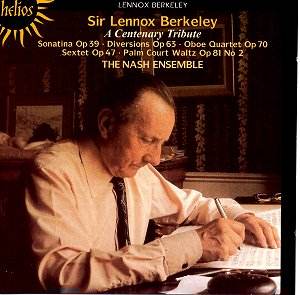Sir Lennox Berkeley’s Sonatina for Piano Duet
exemplifies many of the strengths of this music. It is approachable
and eminently very well-behaved in the best English fashion. It
is given a superb performance by Ian Brown and Kathryn Stott (the
latter recently
encountered on an excellent BIS disc of Schulhoff’s piano
music: BIS CD1249). Together, Brown and Stott project the smooth,
unruffled exterior of the central Andante with the clean musicality
they display elsewhere. Their interplay is a joy to hear.
Moving on a decade compositionally, the Diversions
for oboe, clarinet, bassoon, horn and string quartet, the composer’s
Op. 63, was written for the 1964 Cheltenham Festival. If there
is a link between Diversions and a Mozartian Divertimento
it resides in the light-hearted nature of the resultant compositions.
Perhaps the most interesting movement is the third (Lento), which
is sparser in effect than the others (and also illuminated by
Michael Collins’ lovely clarinet playing), itself leading to an
angular, spiky finale.
The Sextet of 1955 is scored for clarinet, horn
and string quartet. Once again, the standard of performance is
extremely high (the neo-classical, Stravinskian feel of the Allegro
moderato is most affecting). Gareth Hulse’s playing of the solo
part in the Oboe Quartet ranks with the best, although this piece
does seem rather to outstay its welcome: perhaps the best movement
is the final Andante, an example of pure English pastoral writing.
The brief Palm Court Waltz for piano duet acts as a delightful
‘encore’.
This is a disc that will yield many pleasures.
Colin Clarke
